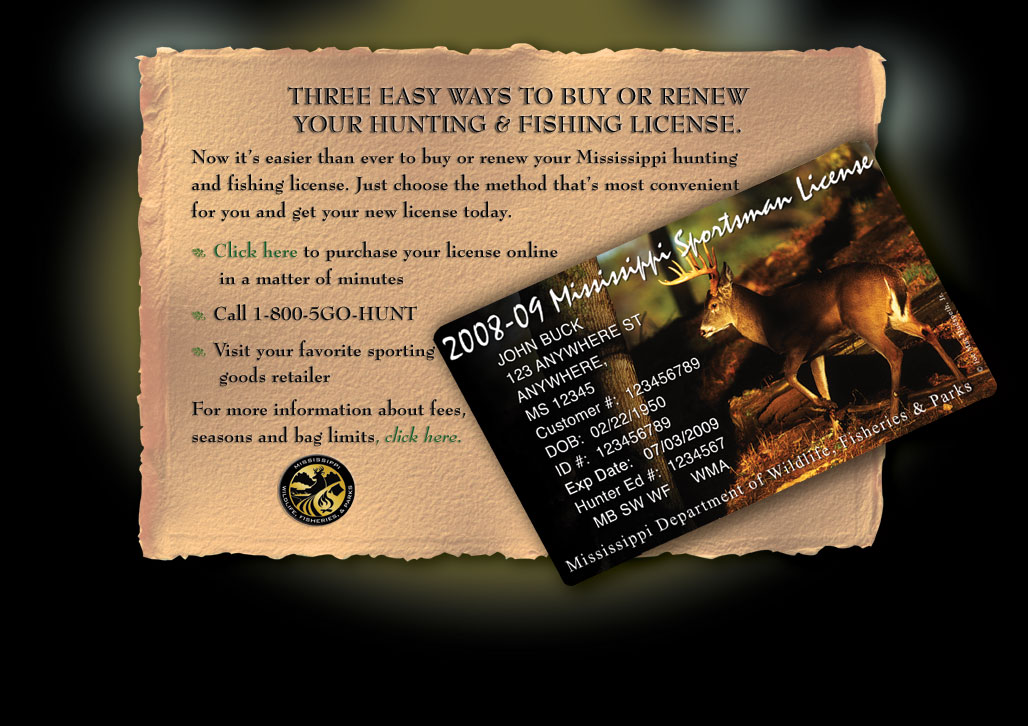Hunting License: Your Ultimate Guide To Legal Hunting
Hunting license is a crucial requirement for anyone who wants to engage in legal hunting activities. Whether you're an experienced hunter or a newcomer, obtaining the proper license ensures that you comply with regulations designed to protect wildlife and promote sustainable hunting practices. This guide will provide you with all the essential information you need to understand the process, requirements, and benefits of obtaining a hunting license.
Hunting has been an integral part of human culture for centuries, serving as both a means of sustenance and a recreational activity. However, as wildlife populations have become more vulnerable due to habitat loss and overhunting, governments worldwide have implemented strict regulations to ensure that hunting remains sustainable. A hunting license is at the heart of these regulations, serving as a legal permit that allows individuals to hunt specific species under controlled conditions.
Understanding the nuances of hunting licenses is vital for anyone interested in participating in this activity. From the types of licenses available to the application process and associated fees, this guide will walk you through everything you need to know. Let’s dive into the details to ensure you’re fully prepared for your next hunting adventure.
Read also:Barron William Trump Diagnose The Story Behind The Spotlight
Table of Contents
- What is a Hunting License?
- Types of Hunting Licenses
- How to Get a Hunting License
- Cost of Hunting Licenses
- Regulations and Laws
- Benefits of a Hunting License
- Hunting Education and Safety
- Renewal Process
- Frequently Asked Questions
- Conclusion
What is a Hunting License?
A hunting license is an official permit issued by government agencies to authorize individuals to hunt specific animals within designated areas and during specified seasons. This document ensures that hunters adhere to conservation laws, which are designed to protect wildlife populations and their habitats. By obtaining a hunting license, individuals contribute to the sustainable management of natural resources.
Hunting licenses are typically issued by state wildlife agencies in the United States and by national or regional authorities in other countries. These permits often come with restrictions on the type of game that can be hunted, the methods allowed, and the specific times of the year when hunting is permitted. Hunters are required to display their licenses while in the field to demonstrate compliance with the law.
Importance of a Hunting License
- Ensures compliance with wildlife conservation laws
- Helps regulate hunting activities to prevent overhunting
- Supports funding for wildlife management programs
Types of Hunting Licenses
There are various types of hunting licenses available, depending on factors such as age, residency, and the species being hunted. Understanding the differences between these licenses can help you choose the one that best suits your needs.
Resident vs. Non-Resident Licenses
Resident hunting licenses are typically offered at a lower cost to individuals who live within the state or country where they plan to hunt. Non-resident licenses, on the other hand, are available to out-of-state or international hunters but often come with higher fees.
Species-Specific Licenses
Some hunting licenses are designed for specific types of game, such as deer, turkey, waterfowl, or small game. These licenses may require additional tags or permits, depending on the species and the hunting location.
How to Get a Hunting License
Obtaining a hunting license involves several steps, including meeting eligibility requirements, completing necessary education courses, and submitting an application. Below is a detailed breakdown of the process:
Read also:Charles Johnson Net Worth The Untold Story Of Success And Wealth
Eligibility Requirements
- Be of legal age (varies by state or country)
- Provide proof of residency for resident licenses
- Pass a hunter education course if required
Application Process
Once you meet the eligibility criteria, you can apply for a hunting license through the appropriate wildlife agency. Many states and countries offer online applications, making the process convenient and efficient. Be sure to submit all required documentation, including proof of education and residency, along with the appropriate fee.
Cost of Hunting Licenses
The cost of a hunting license varies depending on factors such as residency status, age, and the type of license being purchased. Resident licenses are generally more affordable than non-resident licenses, and discounts may be available for seniors or junior hunters. Additional fees may apply for species-specific tags or permits.
Factors Affecting License Costs
- Residency status
- Age of the hunter
- Type of game being hunted
- Location of the hunt
Regulations and Laws
Hunting is governed by a complex set of regulations and laws designed to ensure the sustainability of wildlife populations and the safety of hunters. These regulations cover everything from hunting seasons and bag limits to the types of weapons allowed and the proper disposal of game.
Key Regulations to Know
- Hunting seasons and closures
- Bag limits for specific species
- Weapon restrictions and safety guidelines
Benefits of a Hunting License
Obtaining a hunting license offers numerous benefits beyond the opportunity to participate in this popular activity. Hunters contribute to wildlife conservation efforts, support local economies, and gain access to exclusive hunting areas. Additionally, the fees collected from hunting licenses often fund critical wildlife management programs.
Economic Impact of Hunting
Hunting generates billions of dollars annually in revenue, supporting jobs and businesses in rural communities. By purchasing a hunting license, you play a vital role in sustaining these economic benefits while enjoying the thrill of the hunt.
Hunting Education and Safety
Safety is a top priority for all hunters, and proper education is essential to ensure that everyone remains safe while in the field. Many states require hunters to complete a hunter education course before obtaining a license. These courses cover topics such as firearm safety, first aid, and wildlife identification.
Key Topics in Hunter Education
- Firearm safety and handling
- Wildlife conservation principles
- First aid and emergency preparedness
Renewal Process
Hunting licenses typically need to be renewed annually, and the process is often straightforward. Many states allow hunters to renew their licenses online, saving time and effort. Be sure to check the expiration date of your current license and renew it well before it expires to avoid any interruptions in your hunting activities.
Tips for a Smooth Renewal
- Keep track of your license expiration date
- Renew early to avoid last-minute issues
- Ensure all required documentation is up to date
Frequently Asked Questions
Below are some common questions hunters have about hunting licenses:
Q: Can I use my hunting license in multiple states?
A: No, hunting licenses are typically valid only in the state or country where they were issued. You will need to obtain a separate license for each location where you plan to hunt.
Q: Are there discounts for senior hunters?
A: Yes, many states offer discounted hunting licenses for senior citizens. Check with your local wildlife agency for specific eligibility requirements and pricing.
Conclusion
Obtaining a hunting license is a crucial step for anyone who wants to participate in this rewarding activity. By understanding the types of licenses available, the application process, and the associated costs, you can ensure that you comply with all regulations and contribute to the sustainable management of wildlife resources. Remember to prioritize safety and education, and always adhere to local laws and guidelines.
We encourage you to share this article with fellow hunters or leave a comment below with any questions or feedback. For more information on hunting and related topics, explore our other articles on our website. Happy hunting!


